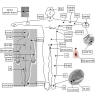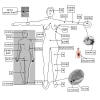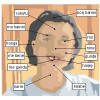Content
- Intro
- Vocabulary
- Greetings
- Grammar
- Exercises (workbook, lesson 10)
- Answers (answer book, lesson 10)
|
10.A. Intro |
|
Boro gahamo |
Explore the human body and learn the Zarma words for most parts of the body and many organs. To enlarge a drawing, move the pointer to the drawing of interest and click the left mouse button. Read the text below the picture. Each picture has a mirror image that enables you to practice your Zarma knowledge. By clicking on the last line text below the picture you can easily switch between these two.
Some Zarma words may be used for different body parts. For example 'ce' is used for 'leg' but also for the different parts of the leg, 'thigh', 'shin' and 'foot'. For some body parts there are synonyms, for example, both 'jesse' and 'jase' mean 'shoulder' and 'upper arm'. |

a male body |

|

a female body
|

a male body inside
|

|

a female body inside
|
|
| |
10.B. Vocabulary |
|
|
Learn these words by heart.
Extra
Move the mouse to one of the underlined words and a sentence in which the word is used will appear. Click the left mouse button and a photo will appear in a popup. When you move the pointer on the screen with your mouse over the photo the translation of the Zarma sentence will show. |
| |
Verbs
| Zarma |
English |
Pronunciation [1] |
| bisa # |
to go past, to be better than, to be preferable, to exceed |
bî sa |
| faakaaray |
to converse, to visit |
faa kaa ray |
| fiti |
to open |
fi ti |
| funa |
to live, to be alive (not to reside) |
fu na |
| haggoy |
to be careful, to be careful of, to look out for, to watch out |
hag goy |
| hima # |
to be careful, to be careful of, to look out for, to watch out |
hi ma |
| hina |
to cook |
hi na |
| lordi |
to order, to command [corrupted French, from l'ordre] |
lor di |
| nama |
to bite |
nam a $ |
| naŋ |
to permit, to let, to leave, to leave off |
naŋ |
| naanay# |
to trust, to have confidence |
naa nay |
| naanay ... ga |
to trust in, to rely on |
|
| ŋwaaray |
to beg, to ask insistently, to plead |
ŋwaa ray |
| sobay |
to continue, to go ahead (not physically necessarily), to keep going |
so bay |
| taa |
to receive, to accept, to take |
taa |
| yadda |
to agree, to consent, to approve |
yad da $ |
| yaafa |
to forgive |
yaa fa $ |
| yaari |
to take care of; to keep, to hold |
yaa ri |
| zay |
to steal, to rob (usually owner absent) |
zay $ |
|
Notes: |
|
| # |
Signifies verbs that take the direct object afterwards (see Lesson 2.C.1 & 3.D.5). |
| $ |
Indicaties that accent and/or tone may be different, perhaps related to region and/or dialect. For 'nama', 'yadda' 'yaafa' and 'zay' there are no consistency between sources regarding tone :
nama : nam a (1, 4), nam a (13)
yadda :
yad da (1, 4), yed da (13)
yaafa : yaa fa (1), yaa fa (4, 13)
zay :zay (1), zay (4, 13)
|
|
| |
Nouns
| Zarma |
English |
Pronunciation [1] |
| buuru, buuro
|
bread |
buu ru |
| ciiri, ciiro
|
salt |
cii ri |
| faakaaray, faakaara
|
conversation, visit |
faa kaa ray |
| foobu, foobo
|
clay water pot, earthenware jar; by extension water jug |
foo bu |
| haw ji, haw jiyo |
butter |
haw ji, haw ji yo |
| ibar, ibaro |
enemy |
i ba re |
| ji, jiyo |
grease, oil, rendered fat |
ji, ji yo |
| lordi, lordo |
commandment, order |
lor di |
| nanay, nanayo |
trustworthiness |
naa nay, naa nay o |
| taali, taalo |
wrong, error, mistake, fault (blameworthy) |
taa li |
| zay, zayo |
thief, robber |
zay, zay o $ |
|
Notes: |
|
| $ |
Indicaties that accent and/or tone may be different, perhaps related to region and/or dialect. For 'zay' there is no consistency between sources regarding tone :
zay : zay, zay o (1), zay (4, 13)
|
|
| |
Adverbs, adjectives, etc.
| Zarma |
English |
Pronunciation [1] |
| ce ga (adverb) |
afoot |
ce gâ |
| do (preposition) |
by means of |
do * |
| dõ (conjunction) |
then (in that case), therefore (rarely)] |
dõ * |
| hala (prepositional uss; precedes object) |
until, till, to the time that, as far as |
hâ la |
| jerga (preposition) |
beside, alongside |
jer ga |
| tilas (adverb; noun) |
necessity, must, should |
ti las |
| walla (interjection) |
by God short (for wallahi I swear by God); up on my word, forsooth (oath used by most Zarmas, at the end of many statements, not realy requiring an oath);
learn to distinguish it from 'wala' (or) |
wal la |
| waati kaŋ (conjunction) |
whenever, when (in general in future) |
waa ti kaŋ |
| ya din (conjunction) |
thus, so (French 'ainsi') |
yá din |
| zama (conjunctival use in references to time and with subjunctive) |
so that, in order that |
za ma * |
|
Notes: |
|
| * |
This word has different meanings depending on pronunctiation. |
|
|
| [1] |
Legend for pronunciation (see Pronunciation guide for details) |
|
italic |
tone is high |
| |
under score |
tone is low |
| |
vowel with ^ |
long vowel, e.g., ê |
| |
vowel with ` |
short vowel, e.g. è |
| |
bold |
syllable on which the principle emphasis falls
|
|
|
10.C. Greetings (fooyaŋey) |
|
|
In earlier lessons we have learned to greet an individual and a group, to greet a person at his work and to say welcome and goodbye. We also learned to thank someone and to ask pardon. We learned the initial greetings, about the greetings that may be used after the initial "hello" and the inquiry about their night or day and about market talks. The previous lesson we learned to say goodbye and to welcome someone.
This is the last lesson about greetings and special attention is given to the often used 'Barka'. |
1. |
After a visit |
| |
| |
Zarma |
English |
| Person A |
Fonda faakaaray |
Greeting with the conversation / visit |
| Person B |
Ngoyya. |
Thanks. |
|
| |
|
2. |
Condolence |
| |
| |
Zarma |
English |
| Person A |
Fonda tilas |
Greetings with the necessity. |
| Person B |
Tilas no. |
It is a necessity. |
|
| |
|
3. |
The return of someone |
| |
| |
Zarma |
English |
| stay-behind |
Barka. |
Blessings, |
| Traveller |
|
|
| Option 1 |
Barka day. |
Blessings only. |
| Option 2 |
A s'ibarey ga. |
Not for the enemies. |
| Option 3 |
Barka si n'ibarey ga. |
No blessings for the enemies. |
| Option 4 |
Barka s'ibare ga. |
No blessings for an enemy. |
|
| |
The correctly answer when quickly spoken is not 'a si barka'.
In general, any greeting beginning with a 'barka' uses one of these replies. The first is best and probably most commonest. If you do not wish to refuse blessings on your enemies, you should say: 'Ba ni ibarey ga', i.e. 'Even on your enemies'. |
|
| |
10.D. Grammar |
|
|
Subjects in this lesson:
- Subjunctive
- Verb forms in conditional sentences
|
|
10.D.1. Subjunctive |
The subjunctive mood is used to express the speaker's attitude about the likely hood or factuality of a given situation. This is not actual action, but possible action. The subjunctive in Zarma is formed with the particle 'ma' in the regular place for an auxiliary (particle). The following examples are some of its uses. In English an infinitive is used in many of these places.
There are six situations in which the subjunctive mood is used in Zarma, these are when:
|
|
Expressing a desire |
You may express a desire with the verb 'ba' (to desire, to want, to like). The subjunctive is only used when 'ba' expresses a desire and not in other cases. Contrary to the English grammar, the infinitive takes its own subject, though we do not translate it with a separate subject. |
| Zarma |
English |
| Ay ga ba ay ma koy fu suba. |
I want to go home tomorrow
Literally: I want that I go home tomorrow. |
| A si ba nga izo ma goy ne. |
He doesn't want his child to work here. |
|
up |
Admonishing against something |
The subjunctive is used when admonishing a person against a thing which might happen. |
| Zarma |
English |
| Haggoy 1 a ma si kaŋ ni boŋ! |
Take care it doesn't fall on your head! |
| Guna ay se i ma s' ay zay! |
Watch out for me they don't robe me! |
1 Haggoy is imperative mood (see Lesson 11.D.2) |
| up |
Consenting, forbidding, ect. |
After verbs of consenting, forbidding, asking, commanding, etcetera the subjunctive mood is used in Zarma. |
| Zarma |
English |
| Ay si naŋ i m' a te ya din. |
I won't allow it to be done thus. |
| I mana yadda a ma koy. |
They wouldn't agree for him to go. |
| Iri si taa i ma kond' a. |
We won't accept for them to take him away. |
| Ay n' a ŋwaaray a m' ay no dala. |
I begged him to give me a dela (five francs). |
| Iri ci a se a ma sobay hal' a kulu ma ban. |
We told him to continue until it's all finished. |
|
up |
Impersonal verbs |
| After many impersonal verbs the subjunctive is used as well. |
| Zarma |
English |
| Tilas ay ma koy sohõ. |
I must go now. |
| A ga tilas ay ma koy sohõ. |
It is necessary to me to go now. |
| A bisa iri ma s' a ŋwa. |
We 'd better not eat it. |
| A ga hima ni ma taalo yaaf' a se. |
You ought to forgive him the fault.
(Literally: It will be fitting [if] you forgive him the fault.) |
| Ni ga hima ka taalo yaaf' a se. |
You ought to forgive him the fault.
(Literally: You will be fitting to forgive him the fault.) |
|
up |
Conjunctions 'hala' and 'zama' |
After the conjunctions 'hala' and 'zama' when they mean 'so that' or 'in order that' the subjunctive mood is used in Zarma. |
| Zarma |
English |
| Ay ga nooru ceeci hal' ay ma day ŋwari. |
I will seek money in order that I may buy food. |
| I na hanso wi zama a ma si boro fo nama koyne. |
They killed the dog so that he won't bite anyone anymore. |
|
up |
Asking to do or to don't |
| When asking a question as to whether the speaker should do some action or not, the subjunctive form is used. There is an idiom for this type of sentence too. The personal pronoun 'ay' and the auxiliary
'ma' may be jointed together to 'ya'. |
| Zarma |
English |
| Ay ma furo? |
I should enter? |
| Ya furo? |
|
| |
| Ay ma kande gunguri, wala? |
Should I bring eggs? |
| Ya kande gunguri, wala? |
|
|
back |
|
10.D.2. Verb forms in conditional sentences |
The subjunctive mood is not used in conditional sentences, but rather the indicative. However, in complex sentences beginning with an 'if' clause, the verb in this clause has the past (completed) tense form. Whereas the verb in the principle clause has the present future (non-completed) form, regardless of what tenses these clauses really represent to us. This may be because the action of the 'if' clause must always be completed before the action of the 'therefore' clause can happen. |
| English |
Zarma |
| Combination of two past tenses |
| If I had known it was he, then I should not have left. |
Nd'a y bay nga no, dõ ay si dira |
| If rain had not come this year, then there would have been no grain. |
Nda hari mana kaa haraŋ, dõ hayni si te. |
| Combination of past en future |
| Even though he robed me, I will trust him. |
Ba a n' ay zay, ay ga naanay a ga. |
| If they have kept my word, they will keep your word. |
Nd' i n' ay sanno yaari, i g' araŋ sanno yari. |
| Combination of present and future |
| If I don't get it done today, I'll get it tomorrow. |
Nd' ay mana du a hunkuna, ay ga du a suba. |
| Combination of two future tenses |
| I'm going to town. If I'll see Kimba, I'll tell him to come to you. |
Ay ga koy kwaara. Nd'ay di Kimba, ay ga ci a se a ma kaa ni do. |
| If I'll finish it, I'll bring it |
Nd' ay n' a ban, ay ga kand'a. |
|
|
|
back |
| |
| |
|









